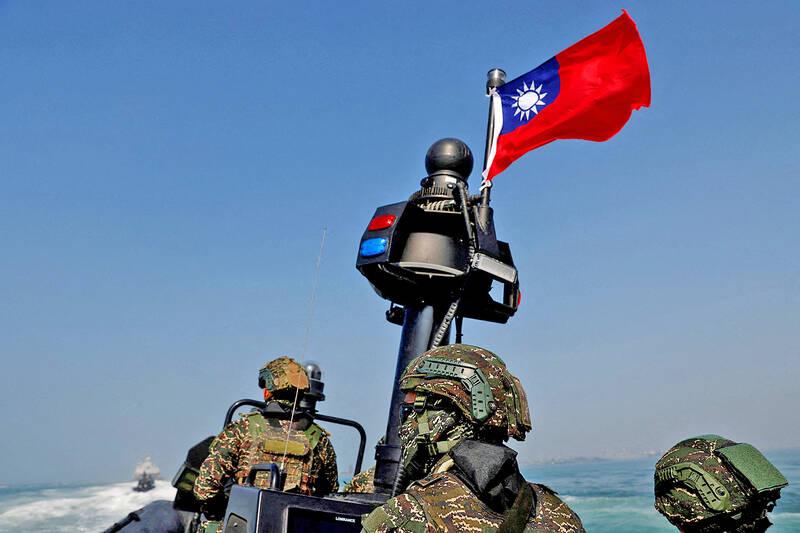The US should amend an existing law to add Taiwan to the list of "NATO Plus" allies and streamline future arms sales, a US commission said yesterday in its annual report to Congress.
The recommendation was made in the report by the US-China Economic and Security Review Commission (USCC), which contained chapters on US-China economic and trade ties, security relations, and Taiwan and Hong Kong.

Photo: Carlos Garcia Rawlins, Reuters
In the chapter on Taiwan, the commission urged the US Congress to "amend the Arms Export Control Act of 1976 to include Taiwan on the list of 'NATO Plus' recipients," referring to a designation held by South Korea, Japan, Australia, Israel and New Zealand.
Under the Arms Export Control Act, arms sales to NATO Plus countries only have to be approved by Congress if they exceed US$25 million.
Arms sales to Taiwan currently require congressional approval if they are more than US$14 million.
At a congressional hearing yesterday, USCC member and former Pentagon official Randall Schriver said Taiwan's inclusion in NATO Plus would add it to "the most elite category of security assistance partners" and "ease the process of export control review on potential transfers to Taiwan."
The commission also recommended that Congress create a "Taiwan Allies Fund" that would provide foreign assistance only to countries that have an official diplomatic relationship with Taiwan.
Under the proposed program, "no country could receive more than 15 percent of the appropriated funding each year."
"Countries that no longer have a diplomatic relationship with Taiwan would immediately be ineligible for this funding," the commission said.
In a section on Taiwan's implications for the US, the report said that Taiwan "remains a key flashpoint for conflict with China," particularly as Beijing intensifies pressure on Taipei, raising the risk of a miscalculation.
It also said that Taiwan faces "complex decisions" about resource allocation, as it looks to simultaneously counter China's “gray zone” tactics and adopt equipment more appropriate for countering an invasion.
While the US can assist Taiwan in both areas, it also faces challenges in rapidly arming Taiwan because of defense manufacturing limitations and extended delivery timelines, the commission said.
As a result, "Taiwan is unlikely to be armed to a sufficient degree to deter or counter China from invading on its own, and so it will rely on the United States to provide for its deterrence as the PLA [Chinese People’s Liberation Army] continues to approach its 2027 and mid-century modernization goals," the report said.
"Even if it can be deterred from outright invasion, China continues to build the capability to quarantine or blockade the island, which represents a unique challenge for US and Taiwan leaders," it said.
The commission said that although Taiwan Semiconductor Manufacturing Co has invested in building production facilities in the US, Taiwan still remains "by far the most dominant" in advanced semiconductor production.
Any disruption to output on the island would therefore have "major ramifications for the global economy and — more importantly — US national and economic security," the report said.
The USCC was created by the US Congress in 2000 to submit to Congress an annual report on the national security implications of the bilateral trade and economic relationship between the US and China, and to provide recommendations for legislative and administrative actions.

Several Chinese Nationalist Party (KMT) officials including Chairman Eric Chu (朱立倫) are to be summoned for questioning and then transferred to prosecutors for holding an illegal assembly in Taipei last night, the Taipei Police said today. Chu and two others hosted an illegal assembly and are to be requested to explain their actions, the Taipei City Police Department's Zhongzheng (中正) First Precinct said, referring to a protest held after Huang Lu Chin-ju (黃呂錦茹), KMT Taipei's chapter director, and several other KMT staffers were questioned for alleged signature forgery in recall petitions against Democratic Progressive Party (DPP) legislators. Taipei prosecutors had filed

Taiwan would welcome the return of Honduras as a diplomatic ally if its next president decides to make such a move, Minister of Foreign Affairs Lin Chia-lung (林佳龍) said yesterday. “Of course, we would welcome Honduras if they want to restore diplomatic ties with Taiwan after their elections,” Lin said at a meeting of the legislature’s Foreign Affairs and National Defense Committee, when asked to comment on statements made by two of the three Honduran presidential candidates during the presidential campaign in the Central American country. Taiwan is paying close attention to the region as a whole in the wake of a

President William Lai (賴清德) has appointed former vice president Chen Chien-jen (陳建仁) to attend the late Pope Francis’ funeral at the Vatican City on Saturday on his behalf, the Ministry of Foreign Affairs said today. The Holy See announced Francis’ funeral would take place on Saturday at 10am in St Peter’s Square. The ministry expressed condolences over Francis’ passing and said that Chen would represent Taiwan at the funeral and offer condolences in person. Taiwan and the Vatican have a long-standing and close diplomatic relationship, the ministry said. Both sides agreed to have Chen represent Taiwan at the funeral, given his Catholic identity and

NEW WORLD: Taiwan is pursuing innovative approaches to international relations through economics, trade and values-based diplomacy, the foreign minister said Taiwan would implement a “three-chain strategy” that promotes democratic values in response to US tariffs, Minister of Foreign Affairs Lin Chia-lung (林佳龍) said. Taiwan would aim to create a “global democratic value chain,” seek to capitalize on its position within the first island chain and promote a “non-red supply chain,” Lin was quoted as saying in the ministry’s written report to the Legislative Yuan submitted ahead of the legislature’s Foreign Affairs and National Defense Committee meeting slated for today. The Ministry would also uphold a spirit of mutual beneficial collaboration, maintaining close communication and consultations with Washington to show that Taiwan-US cooperation